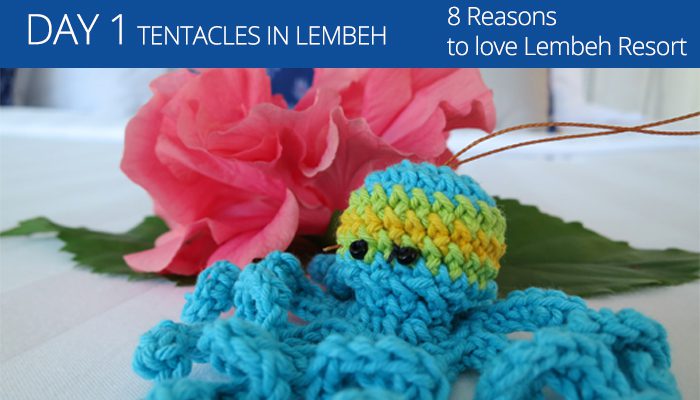Tentacle Festival 2017 with Bret Grasse
Event Roundup
Today marks the close of our first ever Tentacle Festival here at Lembeh Resort with guest presenter and cephalopod expert Bret Grasse.
Outside of his presentations and Q&A sessions, Bret has been enjoying the best of Sulawesi diving in the Lembeh Strait.
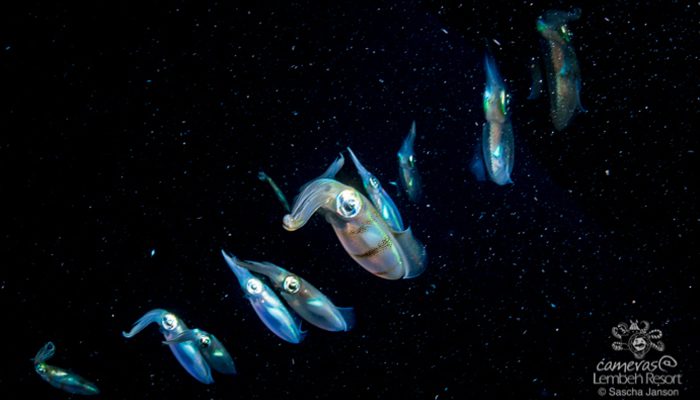
“It seems like every dive we see something new, bizarre, and uniquely interesting. We’ve seen a smorgasbord of various cephalopod species exhibiting a wide variety of behaviors. I’ve been so impressed with the knowledge and experience of all the diving guides and staff. I’ve seen more amazing cephalopod species in the field during these few days that I’ve seen throughout my career”. Bret Grasse
To read species fact-files, find out more about the cephalopods we have here in Lembeh and a full event round up, download and save our PDF here![]()
Over the course of the week Bret has been delighted to see: several long arm octopus, 2 mating blue rings, numerous bigfin reef squid including hatching eggs, flamboyant cuttlefish and their eggs, starry night octopus, coconut octopus, needle cuttlefish and their eggs, juvenile broadclub cuttlefish, algae octopus.
It’s been a great week for cephalopods – a big thank you to all of our talented Dive Guides for finding such a range of species for Bret.
It’s been a great week for cephalopods – a big thank you to all of our talented Dive Guides for finding such a range of species for Bret.
We look forward to showing you the many weird, rare and unique critters and cephalopods that we have here in Lembeh soon! Reservations@LembehResort.com
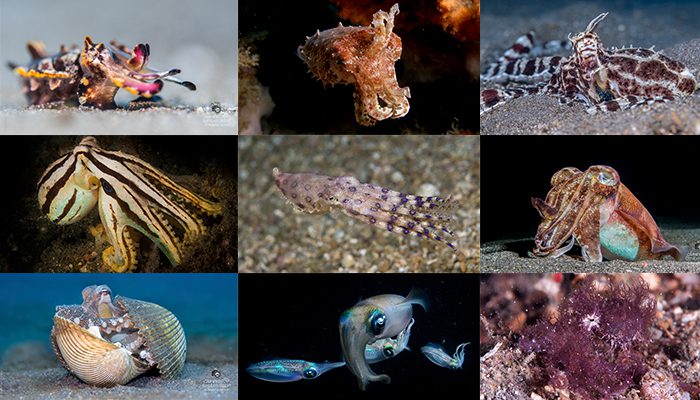
To find out more about Bret and his cephalopod consultancy work check out his website: www.8armassistance.com
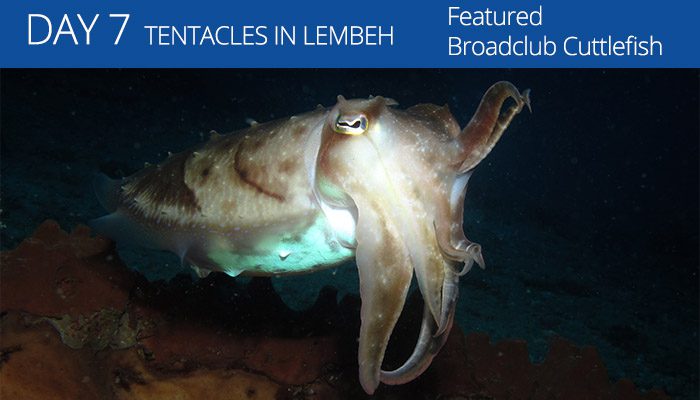
The missing Ink – Innovations into cuttlefish and squid husbandry
Looking after squid and cuttlefish is not an easy task – would you know where to start? Cephalopod expert Bret Grasse has looked after numerous species from egg stage through to adulthood.
Bret’s presentation today revealed to guests some of the challenges of looking after these amazing critters and the ground breaking, creative prototypes which he has developed to overcome them.
Bret has been making more dives with us in the Lembeh Strait and comments, “I’ve been so impressed with the knowledge and experience of all the diving guides and staff. I’ve seen more amazing cephalopod species in the field during these few days that I’ve seen throughout my career. We’ve seen a smorgasbord of various cephalopod species exhibiting a wide variety of behaviors”. Wow!
Featured Tentacle of the Day: Broadclub Cuttlefish (Sepia latimanus)
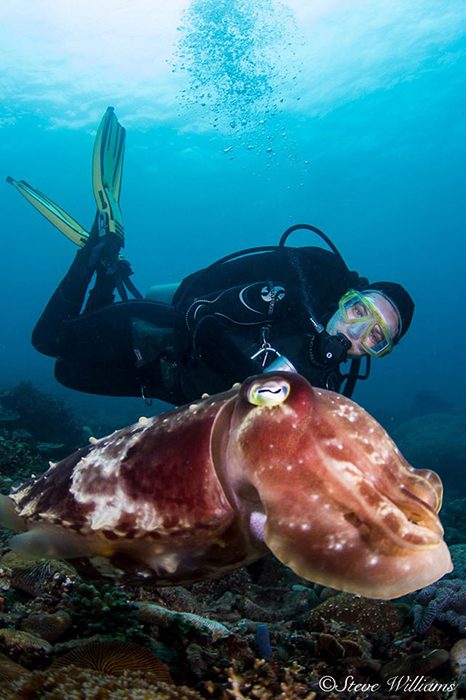
This relatively common species lives in depths that range from shallow reef tops up to 30 meters. The broad club can grow up to 50cm in length and can weigh up to 10 kilograms!
The broadclub is an excellent videography subject, particularly when it is stretching out its tentacles, feeding, mating or depositing eggs. This species preys on crustaceans and fish using a unique cephalopod hunting technique. Bret explained that cuttlefish flash their colors in a hypnotic rhythmic pattern to draw the attention of their prey away from the imminent danger they are in!
Tune in tomorrow for a complete event round up, lots more interesting “ceph” species information and facts from our guest speaker Bret.
If you’d like to join us at Lembeh Resort or join one of our upcoming events contact us on: Reservations@LembehResort.com
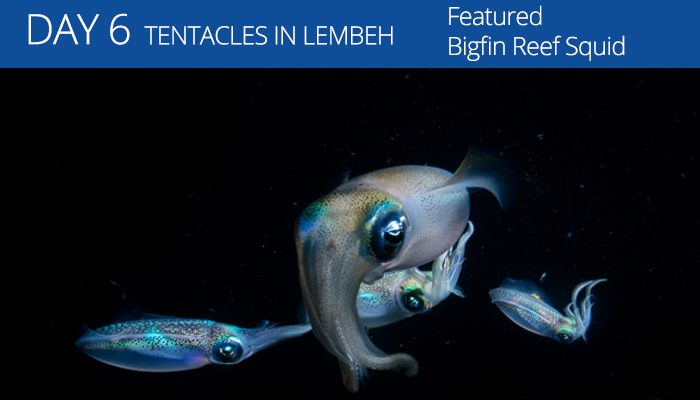
Tentacle Festival Update – Cephalopods of the Deep
Our Tentacle Festival is in full swing and today, cephalopod expert Bret Grasse will talk about challenges related to keeping cephalopods and deep-sea creatures in aquariums.
Did you know that cephalopods and deep-sea creatures are the two most difficult types of critters to keep in aquariums? Our guest cephalopod expert Bret Grasse is at the forefront of groundbreaking techniques, which will allow deep-sea cephalopods to be viewed and studied in aquariums – not an easy feat. Bret commented that, “Many deep sea creatures float freely in the depths and have never come into contact with a hard surface or seen light before. Bringing creatures like this into an aquarium is not without its challenges and has never been done before”.
Bret has been discovering the “cephs” of the Lembeh Strait this week and has already spotted a group of long-arm octopus, numerous bigfin reef squid, flamboyant cuttlefish eggs, 2 blue rings mating, needle cuttlefish, a starry night and a coconut octopus!
Last night Bret and our guests were treated to a wonderful dance and singing performance by the children from our local villages, many of whom we support through our social and environmental commitment initiatives
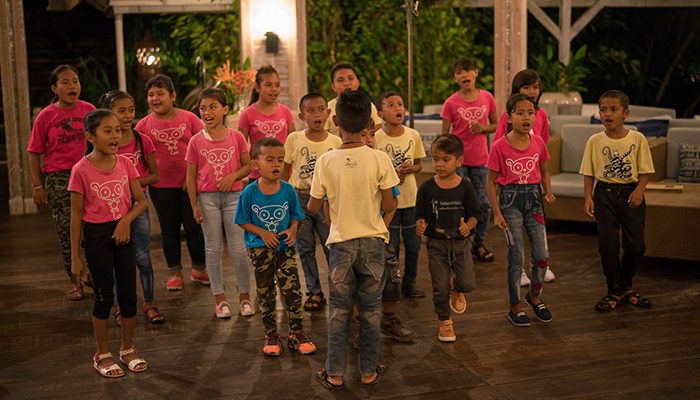


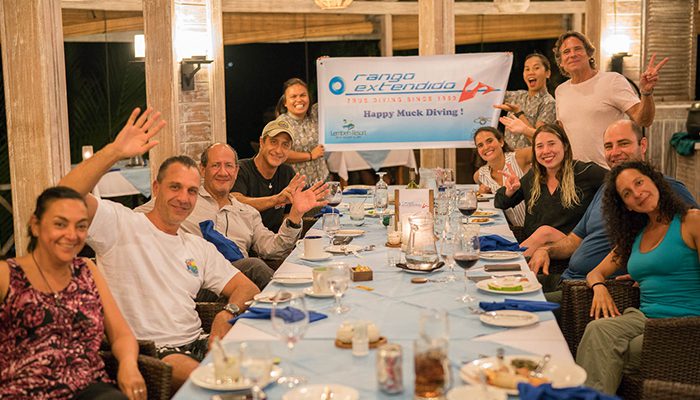
Featured Tentacle of the Day: Bigfin Reef Squid (Sepioteuthis lessoniana)

This is one of the most frequently seen species of squid here in Lembeh despite the fact that they only live for around 6 months. They are small to medium-sized squids growing up to 33 cm in length and they have the fastest recorded growth rate of any large marine invertebrate, reaching 600 g (1.3 lb) in just four months.
We learned from Bret this week how this squids nerves are 10 – 100 times bigger than human nerves and have (amazingly) recently been used to re-attach a human hand during reconstructive surgery.
For all of the amazing critters that we see here in Lembeh please remember we have searchable species information on our Critter Log.
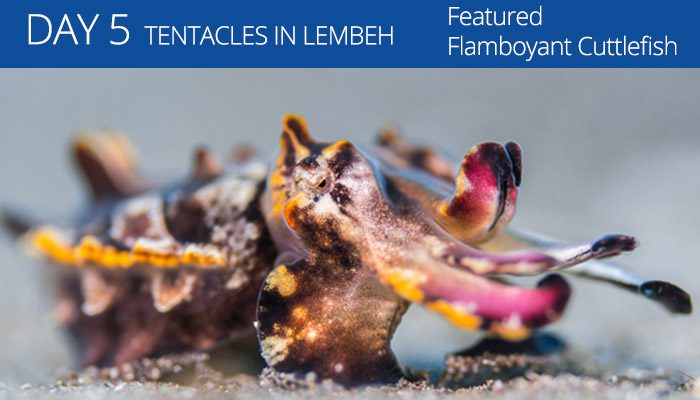
Tentacle Festival Update – Cephalopod Empire!
Being asked to build a “Cephalopod Empire” is not a request many of us will ever hear but that’s exactly what the Marine Biological Laboratory in Woods Hole, Massachusetts, asked of our guest speaker Bret Grasse.
As part of his Empire building, Bret is studying several cephalopod species to identify optimal aquarium conditions for them and to identify and compare breeding habits, behavioural and physical characteristics.
Bret’s empire is in its initial stages with plans to scale up over the next three years. Guests were given a glimpse into the process of designing a world-class facility at a world-renowned institution – which included everything from designing tanks to acquiring species and even the plumbing!
Featured Tentacle of the Day: Flamboyant Cuttlefish: (Metasepia pfefferi)
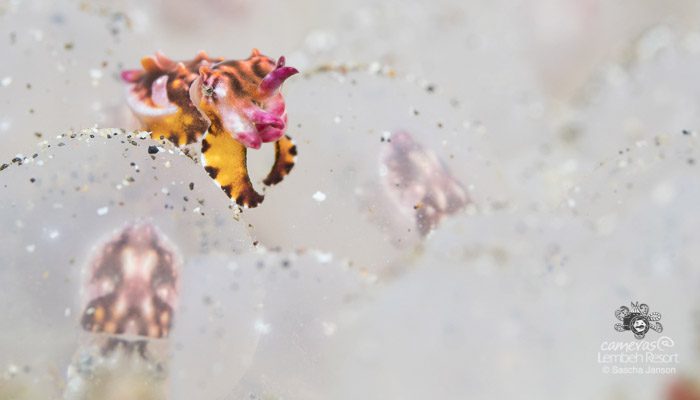
This colorful little critter is a firm favorite with muck diving underwater photographers here in Lembeh. When agitated the aptly named flamboyant will flash from bright purple to red, to orange, to bright white in a matter of seconds.
Flamboyants also have a distinctive method of getting around. Unlike other cuttlefish they will use their lower arms to walk along the sea floor while at the same time flashing hypnotic bands of color to ward off any approaching predators.
When the flamboyant is in a relaxed state it is a dark brown color and as a small species (up to 12cm, but usually between 5 – 8cm) they are tricky to spot. This species is active during the day when they are hunting for small fish and crustaceans.
If you’d like to join us here in Lembeh and dive some of Indonesia’s best dive sites, contact us on reservations@LembehResort.com. We look forward to welcoming you to our beautiful Indonesian resort in North Sulawesi soon.
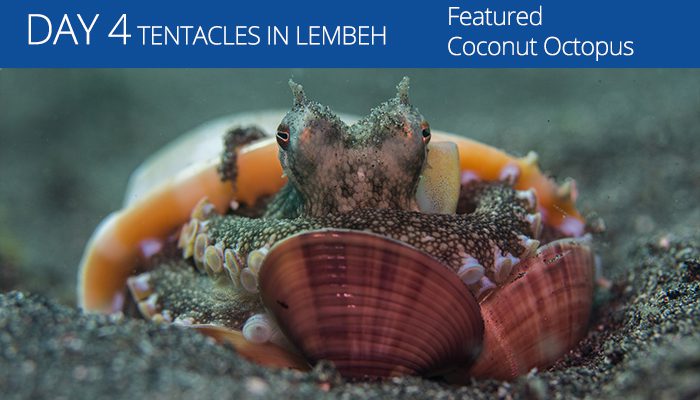
Tentacle Festival Update – Let’s Get Kraken!
Today our guests joined cephalopod expert Bret Grasse’s daily presentation to hear about the “Largest Cephalopod Show in the World”, which Bret designed, opened and managed at the Monterey Bay Aquarium in California.
Guests were treated to a virtual walk through of the facility, the species that can be seen there and heard about how Bret raised many species from eggs to adulthood.
It’s not an easy task conceptualising a facility that will hold the biggest cephalopod collection on the planet. These amazing critters are one of the most intelligent families in the ocean and can detect different individual humans just by smell, unscrew jars to find hidden food and “talk” to each other through color changes.
Tentacle of the Day: Coconut Octopus (Amphioctopus marginatus)
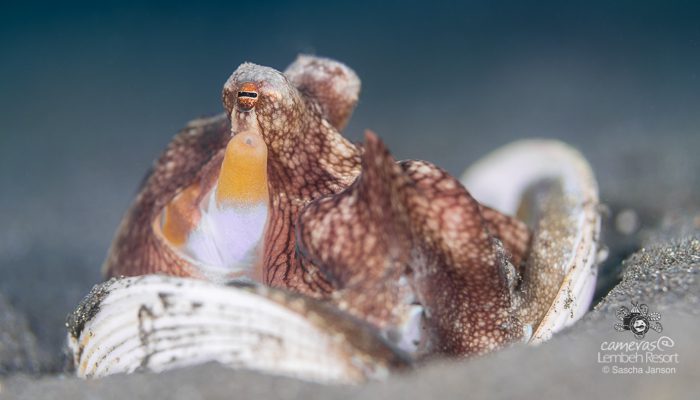
When it comes to the most intelligent species of octopus, the coconut octopus is a serious contender. Also referred to as the veined octopus, it has a sturdy looking brown body detailed with fine darker lines. It is one of the smaller octopus species with arms growing up to 30cm. Coconut octopus change color to match the shade of the sand they live on but become darker to almost black if agitated and their suckers develop a slight bluish tinge.
Coconut octopus lodge themselves inside empty bi-valve shells to shelter but when shells are in short supply they will substitute them for more readily available coconut husks – hence their name. When moving around they carry their shelter underneath their mantle whilst they walk on extended arms as if on stilts. Once inside their shelter, the octopus uses its suckered arms to hold itself inside and pull the other half of the shell or piece of debris over the top creating a tightly sealed trap door!
Are you a critter fan? Underwater photographer? Join us at Lembeh Resort for the undisputed best muck diving in the world and experience the Lembeh Strait with a touch of luxury: reservations@LembehResort.com
Bret, who is now based at the Marine Biological Laboratory, operates his own cephalopod consultancy firm, “8 Arm Assistance” which provides advice and services to marine laboratories, aquariums and other cephalopod related industries and individuals: www.8armassistance.com
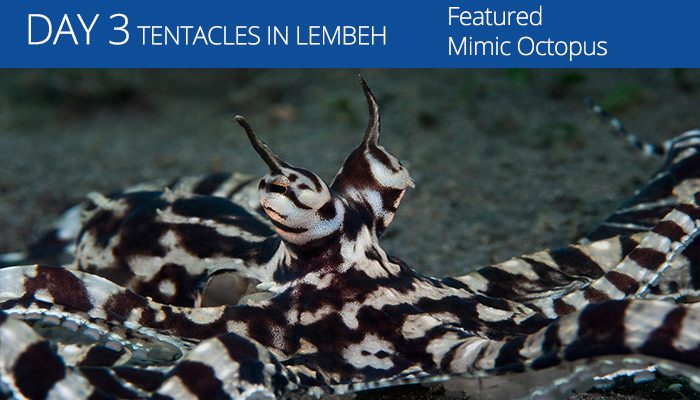
Tentacle Update – Cephalopod Species of the Lembeh Strait
Tentacle Festival with Bret Grasse is off to a great start here in Lembeh. On Bret’s dives this morning he was treated to seeing two blue ring octopus mating, Bret commented, “It was such a special experience to witness that gorgeous animal in its natural environment. To see two mating was incredible. We are only allowed to stay in their world for short periods of time which makes me feel ultimately very privileged. Cephalopods are certainly a massive highlight of Sulawesi diving”.
Bret’s presentation today included an overview of all the species we have here in Lembeh including many of our favorites: Blue ring octopus, coconut octopus, mimic and wonderpus, flamboyant cuttlefish, pygmy and bobtail squids and many more!
Our in house Marine Biologists and our Dive Guides are also taking part in presentations. Marine Biologist Dimpy says “We are excited about having Bret here at Lembeh Resort. I have always been intrigued by octopus and I am looking forward to hearing more facts about the different species he works with”.
Tentacle of the Day: Mimic Octopus (Thaumoctopus mimicus)
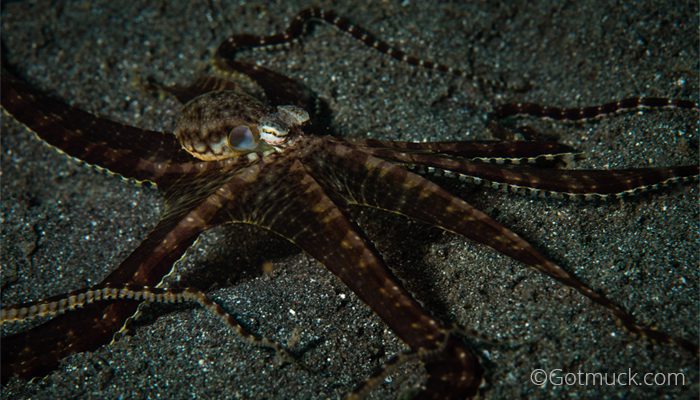
This species is famous for its ability to contort itself into a range of shapes and when it’s in action it’s a show-stopping sight. Some believe that this could be an elaborate form of mimicry designed to ward off predators by imitating other poisonous and venomous marine species. Mimics are naturally a light brown to beige color but when they become defensive they display more noticeable white and brown bands. Our Dive Guides are experts at spotting the mimic – even when only its eyes are visible peering out of the sand.
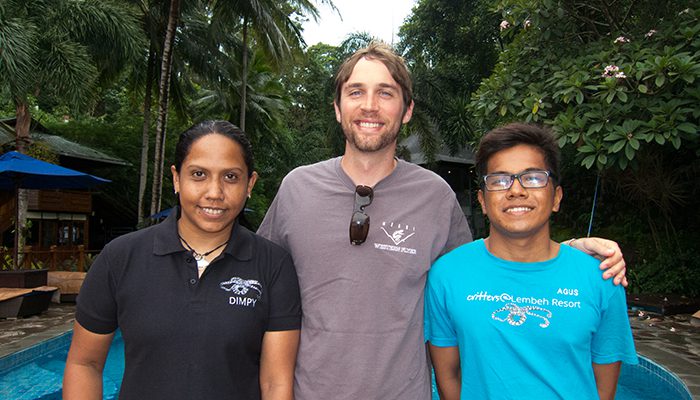
Cephalopod expert Bret Grasse with our two in house Marine Biologists Dimpy (left) and Agus (right)
Are you planning a muck diving trip? Join us at our beautiful Indonesian resort here in the Lembeh Strait. With some of the best scuba diving in Indonesia and in house Marine Biologists and a Photo Pro on site you can rest assured that you are diving with the experts of Lembeh muck diving.
We look forward to welcoming you to North Sulawesi soon: Reservations@LembehResort.com
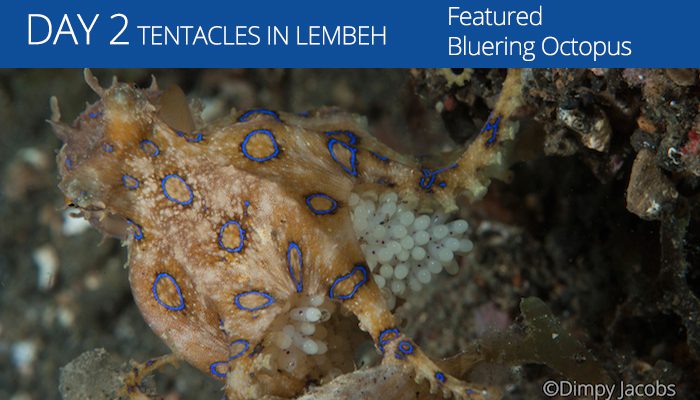
Today Bret started the Tentacle Festival with an introduction to cephalopods and why they are such amazing critters. Here’s a couple of interesting facts from Bret which might surprise you…
- Octopus have 3 hearts, 9 brains and blue blood.
- All cephalopods are invertebrates and mollusks which makes them more closely related to clams than they are to fish.
- The name cephalopod is derived from Greek with “Cephalo” meaning head and “Pod” meaning foot. This is because all cephalopods have large heads which house their brains and organs and it is connected directly to their feet (known now as arms / tentacles).
- Cephalopods have the largest brain to body size ratio in the entire animal kingdom.
Tentacle of the Day: Blue Ring Octopus (Hapalochlaena sp.)
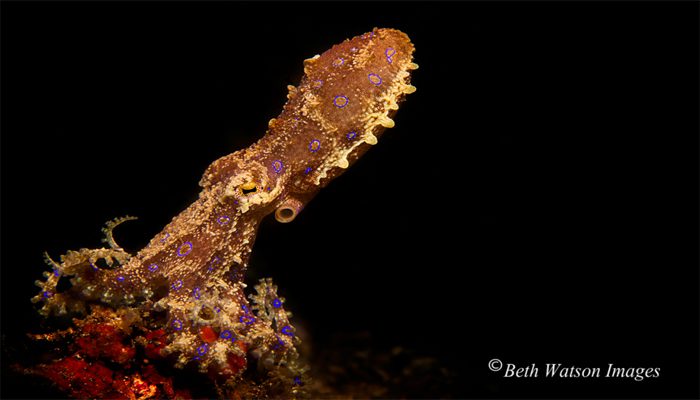
Did you know that there is more than one species of blue ring octopus? It’s true! Scientists have now noticed differences among blue ring octopus and here in Lembeh we have found two distinct species of these little guys. The blue ring might be small but don’t be deceived as they are recognized as one of the world’s most venomous marine animals. Blue ring octopus in Lembeh measure just 4 to 8 cm (1.5 to 3 in) and despite their relatively docile nature they can be incredibly dangerous (even deadly) to humans if provoked. They can be identified by their characteristic blue and black rings and brown to yellowish skin. When the octopus is agitated the brown patches darken and iridescent blue rings appear and pulsate. Blue ring octopus are hunters which feed mainly on small crabs including hermit crabs and shrimp. The best dive sites in Lembeh for finding blue rings are Sarena Besar, Pintu Colada, Critter Hunt, and Nudi Falls.
Our marine biology and underwater photography trained Dive Guides are experts at finding even the smallest of marine species here in the Lembeh Strait so we are hoping for some excellent encounters this week to share with cephalopod expert Bret.
8 Reasons to Love Lembeh Resort
This week is our first ever “Tentacle Festival” with cephalopod expert Bret Grasse in house, so to
be in keeping we are talking about all things in 8’s!
Here are 8 reasons to love Lembeh Resort

Bret says: “I have managed the largest and most diverse collection of cephalopods in the world, BUT I have only had the opportunity to see a few in their natural environment. This expedition will allow me to observe many more species in the wild”. Over the next week of the first ever Tentacle Festival Bret will give presentations about octopus, cuttlefish and squid and his work and research with them – and of course – he’ll be joining our guests for some incredible Sulawesi diving!
When you are scuba diving in Indonesia you’ll find no shortage of tentacle bearing critters and whether squids, octopus or cuttlefish are your tentacle of choice, you’ll have many to choose from. Here’s three of our favorites to whet your appetite for the week ahead!
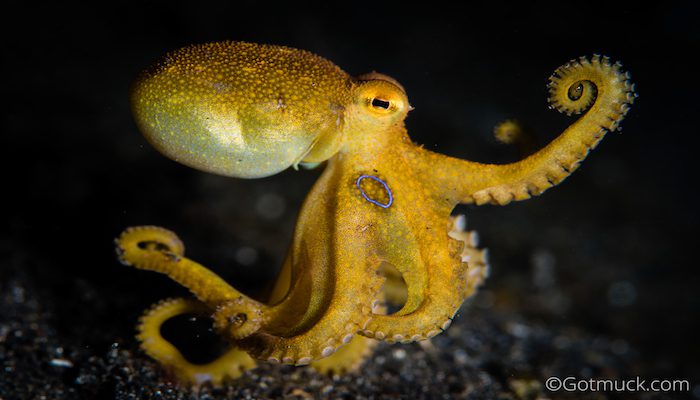
Mototi octopus – one of our rare finds that we hope to show Bret Grasse
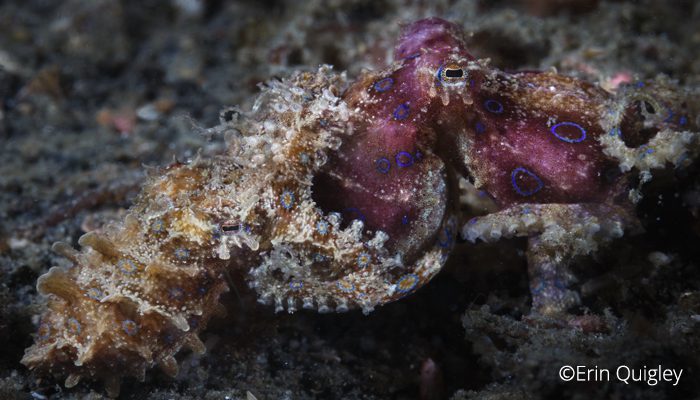
Blue ringed octopus mating – the Lembeh Strait is full of surprises.
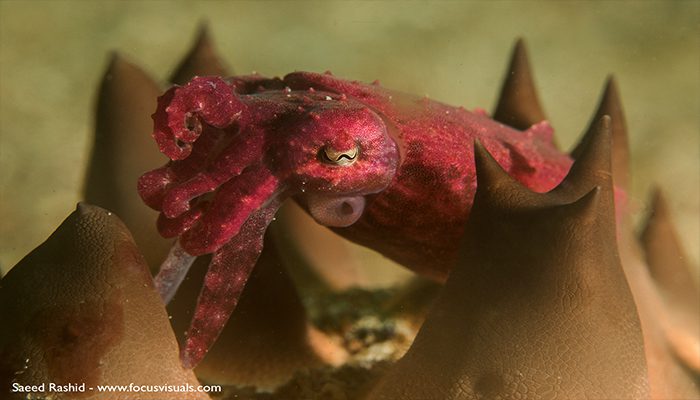
Pygmy cuttlefish – size isn’t everything when it come to cuteness.
If you’d like to join us here at our beautiful Indonesian resort in Lembeh, contact us to make a booking or for more information: reservations@lembehResort.com

